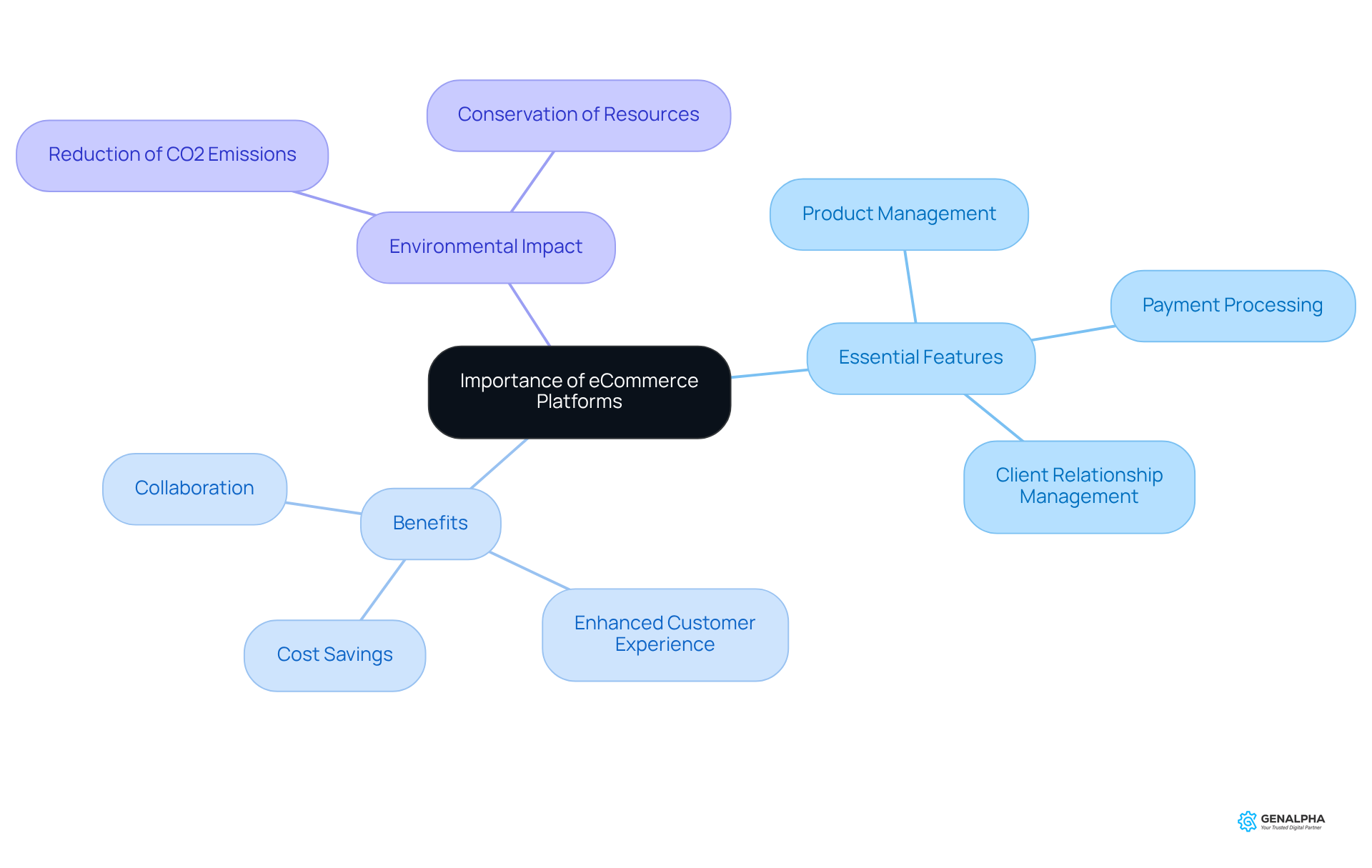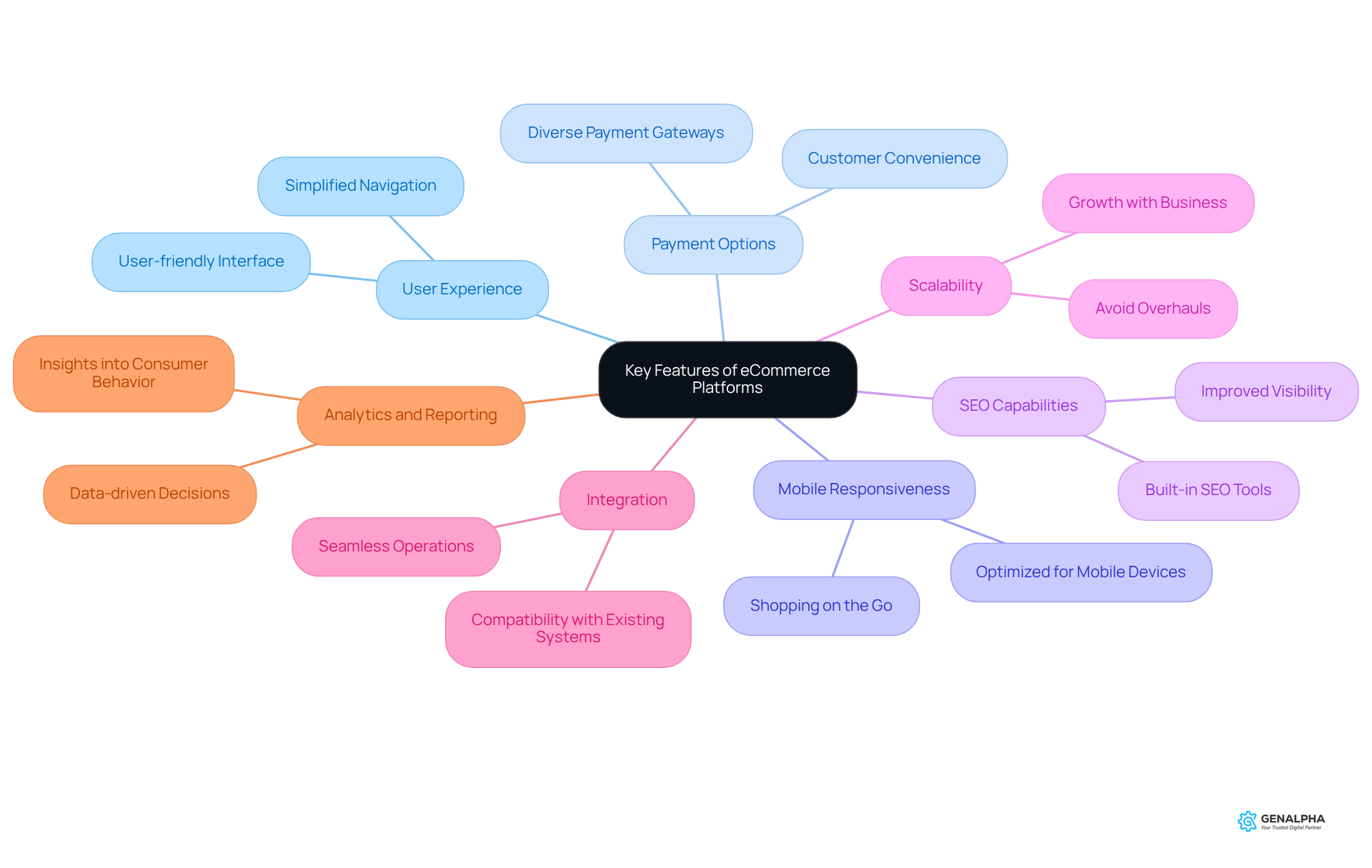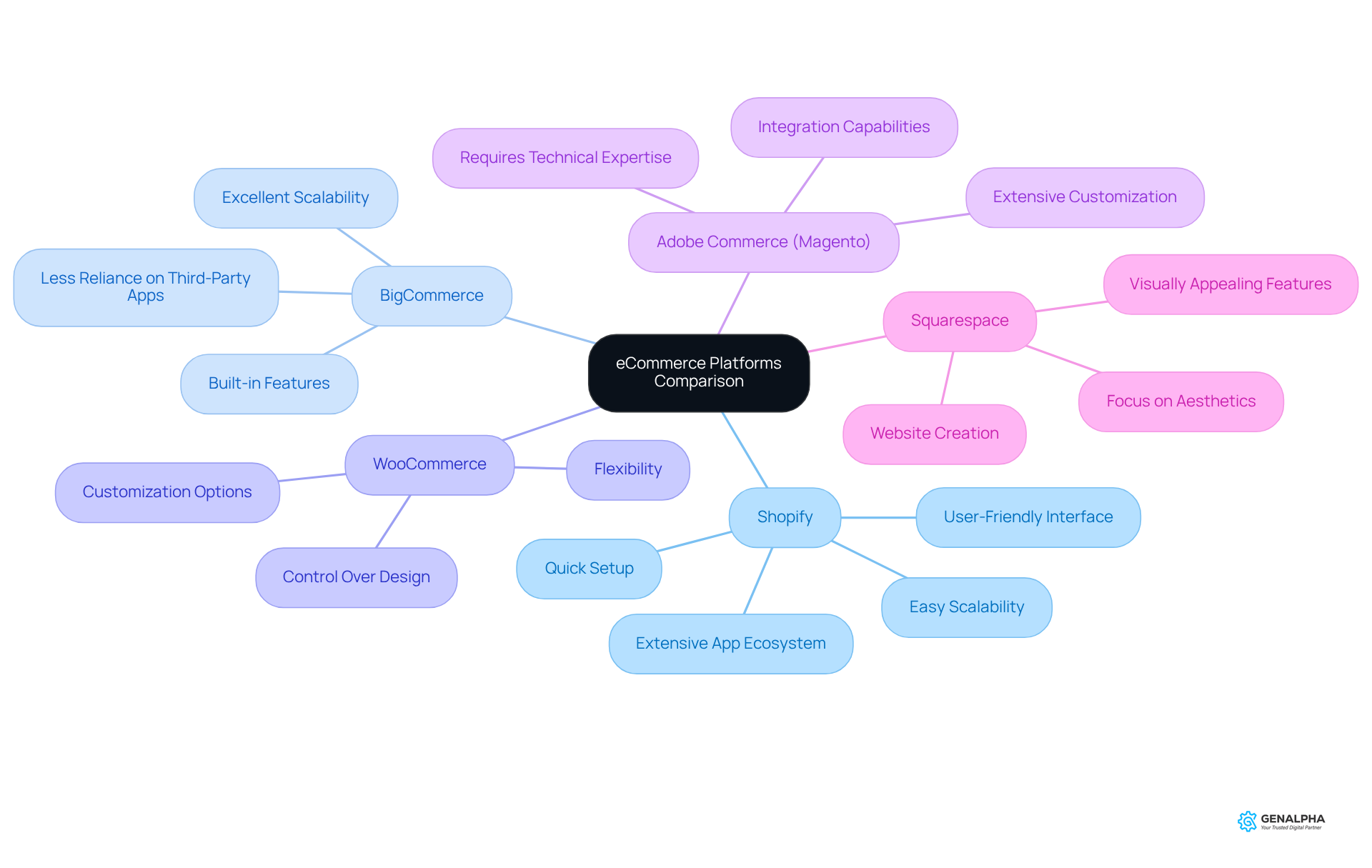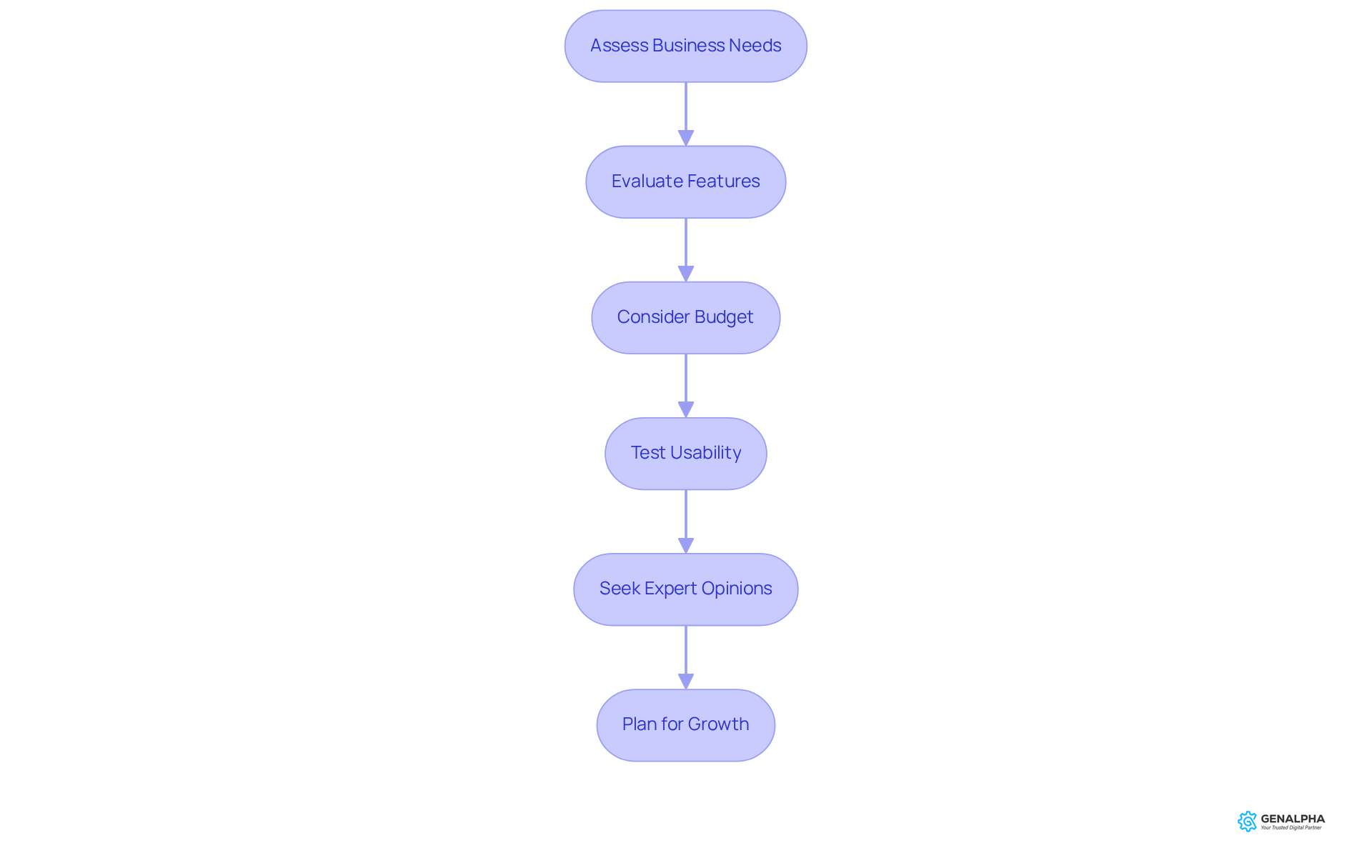Overview
Looking to dive into the world of eCommerce? You're in the right place! This article shines a light on the best platforms out there, offering valuable insights into their features, advantages, and how to choose the right one for you.
Have you ever thought about how user experience can make or break an online store? It’s crucial! Plus, let’s not forget about payment options and scalability—these are game changers for any business. We’ll also take a closer look at popular platforms like Shopify and BigCommerce, comparing them to help you make informed decisions that truly fit your unique needs and goals.
So, are you ready to explore the perfect eCommerce platform? Let’s get started!
Introduction
Navigating the world of eCommerce platforms is essential for businesses looking to succeed in today's competitive digital landscape. These platforms do more than just simplify sales processes; they also elevate customer experiences, making them a must-have for modern retailers.
But with so many choices out there, how do you figure out which platform is the perfect fit for your unique needs and growth goals? In this article, we’ll dive into the top eCommerce platforms, uncovering their features, benefits, and the key factors to consider so you can make a well-informed decision.
Understanding eCommerce Platforms and Their Importance
Online commerce systems are considered the best platforms for ecommerce in internet retail. They help companies sell goods and services efficiently through the web. Think about it—these systems come with essential features like product management, payment processing, and client relationship management. Did you know that B2B eCommerce in the United States is nearly seven times larger than B2C? This just shows how crucial a solid is for manufacturers and distributors who want to remain competitive on the best platforms for ecommerce.
Not only do these systems simplify transactions, but they also enhance customer experiences with personalized suggestions and smooth checkout processes. Companies that have switched to integrated digital B2B solutions often see significant cost savings and better collaboration with retail partners. For example, Huntington Surf & Sport made the leap to a fully digital system, leading to major time and resource savings. They also improved their collaboration with surf brands and aligned their purchasing strategy with what consumers actually want.
Plus, going digital helps the environment! By cutting out printed catalogs, businesses can significantly reduce CO2 emissions. As the market continues to evolve, recognizing the transformative power of the best platforms for ecommerce is essential for any enterprise aiming to thrive in the digital landscape. So, what are you waiting for? It’s time to embrace the change!

Key Features to Consider When Choosing an eCommerce Platform
When you're on the hunt for the perfect eCommerce platform, there are a few key features you really want to keep in mind:
- User Experience: Think about it—a user-friendly interface is crucial for both your clients and your team. No one wants to struggle with complicated menus!
- Payment Options: Offering diverse payment gateways can really boost customer convenience. It’s all about making it easy for them to buy from you.
- Mobile Responsiveness: With everyone shopping on their phones these days, your system needs to be optimized for mobile devices. After all, who doesn’t love shopping on the go?
- SEO Capabilities: Built-in SEO tools are a must. They help improve your visibility in search engines, making it easier for potential customers to find you.
- Scalability: Your platform should grow with your business. You don’t want to face significant overhauls as you expand.
- Integration: It’s vital that your eCommerce platform plays nice with your existing systems, like ERP and CRM. Seamless operations save time and headaches!
- Analytics and Reporting: Robust analytics tools are your best friends. They provide insights into consumer behavior and sales performance, enabling you to make data-driven decisions.
These features, when combined, really enhance your system’s effectiveness, making it one of the best platforms for ecommerce in and driving sales. So, which features resonate most with you as you explore your options?

Comparative Analysis of Leading eCommerce Platforms
In 2025, the best platforms for ecommerce really stand out with their unique offerings. Let's take a closer look:
- Shopify: If you're a small to medium-sized business, Shopify is a fantastic choice. Its user-friendly interface and extensive app ecosystem make for a quick setup and easy scalability.
- BigCommerce: Now, if you’re part of a larger enterprise, BigCommerce might be your go-to. It excels in scalability and comes packed with built-in features, so you won’t have to rely heavily on third-party apps.
- WooCommerce: For those who love WordPress, WooCommerce offers incredible flexibility and customization. It’s perfect for businesses that want control over their online store’s design and functionality.
- Adobe Commerce (Magento): If extensive customization and integration capabilities are what you need, Adobe Commerce is powerful. Just keep in mind, it might require a bit more technical expertise to manage.
- Squarespace: While it’s primarily a website creator, Squarespace also offers visually appealing online sales features. This makes it a great fit for creative enterprises focused on aesthetics.
Each of the best platforms for ecommerce has its own set of advantages and disadvantages. The right choice really depends on your specific organizational needs, budget, and technical abilities. So, which one do you think suits your business best?

Making the Right Choice: Selecting the Best eCommerce Platform for Your Business
Choosing the best platforms for ecommerce can seem like a daunting task, right? Let’s break it down together:
- Assess Business Needs: Start by pinpointing what you really need. Think about your products, who your customers are, and how much you plan to sell.
- Evaluate Features: Next, look at the features offered. Make sure they match your needs, especially when it comes to user experience, payment options, and how well the platform can grow with you.
- Consider Budget: Don’t forget to crunch the numbers! Look at the total cost, including any subscription fees, transaction fees, and potential add-ons that might come up.
- : Why not take advantage of free trials? They’re perfect for checking out how easy the platform is to use for both you and your customers.
- Seek Expert Opinions: Have a chat with industry experts or colleagues. Their insights can be super helpful in guiding your decision based on their experiences with different systems.
- Plan for Growth: Finally, think ahead! Choose a platform that can grow with your business, handling more traffic and sales without a hitch.
By following these steps, you’ll be well on your way to making a smart choice that aligns with your goals and utilizes the best platforms for ecommerce to keep your customers happy. So, what do you think? Ready to dive in?

Conclusion
Choosing the right eCommerce platform is a big deal for businesses looking to shine in the digital marketplace. This article highlights just how crucial it is to get to know the unique features and capabilities of different platforms. When you match these offerings with your specific business needs, you can really boost your operational efficiency and keep your customers happy.
Let’s talk about some key points:
- User experience
- Payment options
- Mobile responsiveness
- Scalability
Each of these features is essential in figuring out how effective an eCommerce platform will be for you. Plus, when we look at leading platforms like Shopify, BigCommerce, WooCommerce, Adobe Commerce, and Squarespace, it becomes clear that there are plenty of options out there, each catering to different business sizes and requirements.
So, as you embark on the journey to find the best eCommerce platform, take a moment to assess your business goals, budget, and future growth potential. Embracing the right tools and strategies can help you streamline your sales processes and create fantastic shopping experiences that keep customers coming back for more. The future of eCommerce looks bright, and picking the right platform could be the game-changer you need for long-term success.
Frequently Asked Questions
What are eCommerce platforms?
eCommerce platforms are online commerce systems that help companies sell goods and services efficiently through the web. They include essential features such as product management, payment processing, and client relationship management.
How significant is B2B eCommerce compared to B2C in the United States?
B2B eCommerce in the United States is nearly seven times larger than B2C, highlighting the importance of a solid eCommerce infrastructure for manufacturers and distributors.
What benefits do eCommerce platforms provide to companies?
eCommerce platforms simplify transactions, enhance customer experiences with personalized suggestions, and offer smooth checkout processes. They also lead to significant cost savings and better collaboration with retail partners.
Can you provide an example of a company that benefited from switching to a digital system?
Huntington Surf & Sport switched to a fully digital system, resulting in major time and resource savings, improved collaboration with surf brands, and better alignment of their purchasing strategy with consumer demand.
How does going digital impact the environment?
Going digital helps reduce CO2 emissions by cutting out printed catalogs, contributing to environmental sustainability.
Why is it important for enterprises to recognize the power of eCommerce platforms?
Recognizing the transformative power of eCommerce platforms is essential for any enterprise aiming to thrive in the evolving digital landscape.




